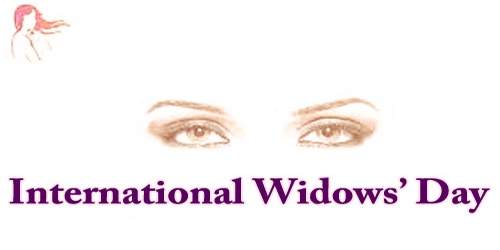Since 2011, the United Nations (UN) observes 23rd June as “International Widows Day”, to draw attention to widows’ voices and perspectives and to galvanize the special support they need. The day was established by The Loomba Foundation to boost awareness of the problem of widowhood. the importance of 23 June is that it had been thereon day in 1954 that Shrimati Pushpa Wati Loomba, mother of the foundation’s founder, Lord Loomba, became a widow. International Widows’ Day may be a global observance and not a public holiday. The loss of a partner is devastating; for several women around the world, especially in developing countries, that loss is magnified by a long-term struggle for his or her basic needs, their human rights, and dignity. The pandemic has just exacerbated the situation with a horrific human tragedy over the past few months, and one that is likely to leave tens of thousands of newly widowed women at the very moment they are cut off from their normal socio-economic and family support. A 2010 book, Invisible, Forgotten Sufferers: The Plight of Widows Around the World, estimates that there are 245 million widows worldwide, 115 million of whom live in poverty and suffer from social stigmatization and economic deprivation purely because they have lost their husbands. This report was introduced to former UN Secretary-General Ban Ki-moon on 22nd June 2010, as part of the awareness campaign of the Loomba Foundation.
An estimated 258 million widows worldwide are living in severe poverty, and almost one in ten. Yet, as the coronavirus (COVID19) and its associated health effects continue to spread across the world, the real number is likely to be much higher and to rise further. As women, they need specific needs, but their voices and experiences are often absent from policies that impact their survival. International Widows’ Day was initiated by the Loomba Foundation in 2005. Now over ever, at the moment is a chance for action towards achieving full rights and recognition for widows. This includes providing them with information on access to a good share of their inheritance, land and productive resources; pensions and social protection that aren’t supported legal status alone; decent work and equal pay; and education and training opportunities. Enabling widows to support themselves and their families often mean tackling social stigma causing alienation, and discriminatory or negative practices. As well as formally recognizing 23rd June as a day of observance, the accompanying resolution called upon “The Member States, the United Nations system and other international and regional organizations to give special attention to the situation of widows and their children.” There is also a need to implement initiatives and policies to end violence against widows and their children, poverty alleviation, education and other assistance to widows of all ages, particularly in the sense of action plans to promote the achievement of the ‘Sustainable Development Goals.’
















